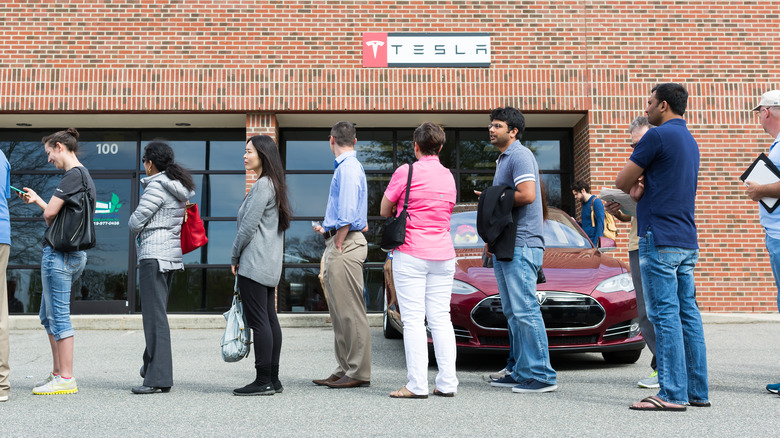The Astonishing Markup New Car Buyers Are Paying Every Time
The markup prices of new cars are on the rise, and those looking to buy brand new should be paying attention. Budget-conscious shoppers hoping to snag a shiny new car straight from the dealership might need to think twice this year. After all, vehicle production in the U.S. went through a rough patch within the past two years alone. It doesn't help that semiconductor shortages are preventing household names like GM from selling their most popular vehicles either. When vehicle supplies are unable to keep up with consumer demand, soaring prices are inevitable, but just how bad is it?
Well, it seems like the monthly sales of new cars in 2022 are suffering from lower averages when compared to three years ago, according to data from automotive research firm Kelley Blue Book. At the same time, prices have increased. In August, the average transaction price of a new Electric Vehicle rose to over $66,000 per unit, which is a 1.7% increase from July and a hefty 15.6% price bump from last year. Unsurprisingly, new luxury car buyers paid the most that month, with luxury vehicle sales averaging over $800 more than the previous month. Meanwhile, non-luxury car sales averaged $1,102 above retail price, and truck buyers surprisingly paid $142 less than retail. Of course, things aren't looking pretty for consumers looking to buy from certain automakers, as a handful of new cars are being offered at staggering markup prices.
Some car brands are getting pricier than others
While the average transaction price of a new Tesla only increased a measly 0.8% from July to August, its EVs still had one of the biggest price percentage increases over the course of a year. Considering Tesla's significant bump in EV pricing for the second time this year, it shouldn't be surprising that buyers paid $69,831 on average; about $11,600 more than in 2021 (a 20.1% increase), per KBB's statistics. Following Tesla is the Stellantis group and its biggest contributor Jeep, with the average Jeep buyer spending over $9,500 more this year (21.6% increase). The Renault-Nissan-Mitsubishi Alliance car pricing also rose over 12%, mostly thanks to its luxury car division Infiniti and its vehicle sales averaging over $9,300 more than last year (an 18% increase).
Although the Volkswagen Group's year-to-year price bump is only about half of Tesla's at 10.4%, average car sales under its Porsche branding were up more than $15,900 from last year (a 15.8% increase). Despite the rising average prices of Stellantis' Jeep and Dodge brands, its subsidiary Fiat sold cars at over $3,200 less (12.1% decline), while EV sales of the Geely Auto Group-owned Polestar were averaging about $5,800 less (a 9.2% decline). Even Daimler and its luxury Mercedes-Benz brand turned into quite a bargain selling at a whopping $6,300 lower than last year (an 8.7% decline). Perhaps now's the best time to ditch that Tesla in favor of a cheaper yet equally classy entry-level Mercedes Benz EV instead.

